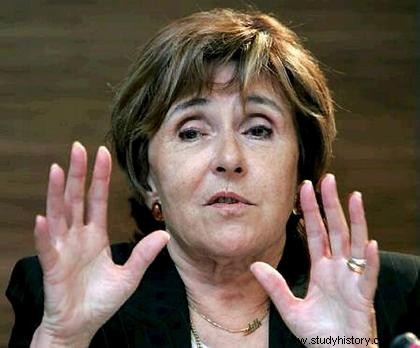Édith Campion, who became through marriage Édith Cresson (born in 1934) is a French politician. Head of government from May 15, 1991 to April 2, 1992, she is the only woman to have been Prime Minister of France.
Daughter of Gabriel Campion, a finance inspector oriented to the political left, Edith Campion was born on January 27, 1934 in Boulogne-Billancourt. She studied and obtained a diploma from the School of Higher Commercial Education for Young Girls (HEC-JF) as well as a doctorate in demography. With these diplomas in hand, she began a career as an economic engineer. In 1959, Edith married Jacques Cresson, export manager for Peugeot, with whom she had two daughters.
Entry into politics and first responsibilities
 In 1965, Edith became involved in François Mitterand's first presidential campaign. She joined the Socialist Party (PS) in 1971, of which she became Secretary General in 1974. Member of the steering committee, she is in charge of young people and students. In 1977, she was elected mayor of Thuré, in the suburb of Châtellerault. In 1978, she failed in cantonal elections and in legislative elections against Jean-Pierre Abelin, whom she then defeated in 1981, 1986 and 1988. In 1979, she was elected to the European Parliament.
In 1965, Edith became involved in François Mitterand's first presidential campaign. She joined the Socialist Party (PS) in 1971, of which she became Secretary General in 1974. Member of the steering committee, she is in charge of young people and students. In 1977, she was elected mayor of Thuré, in the suburb of Châtellerault. In 1978, she failed in cantonal elections and in legislative elections against Jean-Pierre Abelin, whom she then defeated in 1981, 1986 and 1988. In 1979, she was elected to the European Parliament.
In 1981, Edith Cresson became the first woman to accede to the Ministry of Agriculture, but this appointment was very badly perceived by the agricultural world, who saw a provocation in the arrival of a woman in this position. In 1982, she was elected general councilor in Vienne then mayor of Châtellerault in 1983; she will be re-elected to these two positions several times. In 1983, she became Minister of Foreign Trade and Tourism, then of Industrial Redeployment and Foreign Trade in 1984.
The Prime Minister
After François Mitterrand's second victory in 1988, Edith Cresson became Minister for European Affairs and organized the French presidency of the EEC in 1989. But her disagreement with Michel Rocard's European policy led her to resign in 1990. On May 15, 1991, François Mitterrand appoints her to the post of Prime Minister; Edith Cresson becomes the first – and to date the only – woman to take up this position in France.
During her general policy speech to the National Assembly a week later, Edith Cresson set the main priorities of her mandate, in particular the reduction of unemployment, sustainable development, equal opportunities, peace in the Middle East, the limit on arms sales.
In 1992, she signed the Maastricht Treaty with François Mitterrand, which notably provided for the single currency and European citizenship. Taking measures for the "control of immigration", it hardens the policy of the PS in terms of the right of asylum. However, his policy came up against the reluctance of several of his ministers, such as Pierre Bérégovoy and Lionel Jospin. Unpopular and victim of the machismo of the political and media worlds, it is no longer supported by François Mitterrand. On April 2, 1992, however, he entrusted the post of Prime Minister to Pierre Bérégovoy.
The rest of his career
In 1993, Edith Cresson did not stand for re-election. In 1995, she was appointed by François Mitterrand to the European Commission where she was in charge of Science, Research and Development. In 1997, accused of cumulating mandates by Lionel Jospin, she left her post as mayor. The same year, she learns that she has cancer from which she will recover.
In 2001, Edith Cresson took over the presidency of the Foundation for 2 e schools. chance. In 2006, she announced her support for Ségolène Royal for the 2007 presidential elections. The same year, she was convicted in a fictitious employment case by the European Court of Justice. Today free from political commitments, she remains invested in the creation of "second chance schools".
Useful links
Edith Cresson's Wikipedia page
